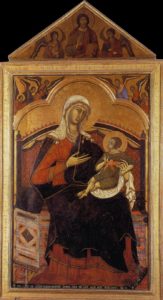Guido da Siena Madonna and Child
In the first week of December 1940 Thomas Merton writes in his Journal about silence. At this time of his life Merton is teaching at English at St Bonaventure’s College at Olean. The idea of joining the Franciscans has receded, as Merton notes: ‘I am impressed and awed by the fact that I cannot join an order’. In the Journal accounts we read of Merton’s reading, some linked to his teaching, and some to his increasing religious devotion. He describes the room he is staying in at the college:
‘I am glad I am in this room. Tacked on the door are pictures of Saint Dominic, Saint Francis receiving the stigmata, two of the Blessed Mother and Child, and one, a Durer, Guido da Siena, The School of Giotto. On my desk, Kierkegaard, The Biographia Literaria, Metaphysical Poetry – Donne to Butler, Saint Bonaventure, Saint Theresa of Avila, Hopkins, Lorca, Aristotle, The Pearl, Little Flowers of Saint Francis, Saint John of the Cross. Wait and see how fast I throw away Byron! Then also Saint Augustine, but waiting to be returned to the library. Two volumes of Skeat’s big Chaucer, also. Somewhere – Blake: not my own. Modern Library and its paltry edition!’
It is from Kierkegaard that Merton reflects on what a vow of silence might be like, and how contemporary life is forcing people to the desert – away from it all.
‘The world is full of the terrible howling of engines of destruction, and I think those who preserve their sanity and do not go mad or become beasts will become Trappists, but not by joining an order. Trappists in secret and in private – Trappists so secretly that no one will suspect they have taken a vow of silence.’
Musing further, Merton says that seeking silence is the only response to, ‘the increase of the unbearable sound of the world’, yet, at the same time, doesn’t think ‘the higher vow of silence is to be sought after.’ Picking up Kierkegaard’s thinking on the type of silence demanded by Abraham in the trial over Isaac, and the similar vow of silence imposed, ‘on the Blessed Mother by the incomprehensible mystery of the annunciation’, or of Saint Francis alone in the presence of the Son, ‘is not to be idly asked for by a terrible coward, afraid of a toothache.’
Despite this we know that by December the following year Merton would enter the Abbey of Gethsemani where he would stay for twenty-seven years under a vow of silence.
